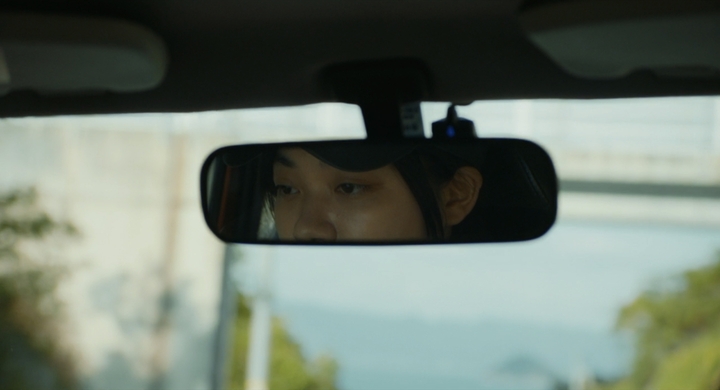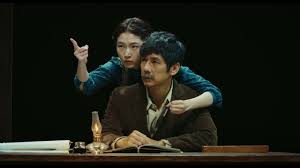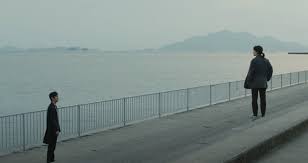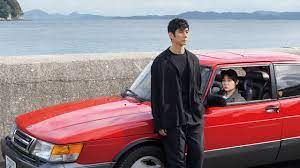
Good Lord! Those last 30 minutes absolutely wrecked me. I bawled big, fat, hot tears like a baby. If ever there was an example of a slow burn movie that builds up to a huge emotional pay off, this is it. Hamaguchi was simply masterful in building one scene upon another. By the time we got to the emotional payoff, I felt ready to explode with feelings (not knowing what kind I’d get). I got some sort of pure mixture of deep sadness with hopeful joy. That is such a rare thing in any sort of story telling, and it is just masterfully done here. I thought the minimal acting (for lack of a better term) done by both Hidetoshi Nishijimi and Tôko Miura add to this. They are so reserved, but you know there is so much bubbling beneath the surface that when that emotion finally comes, it is very powerful.

From a filmmaking perspective, this film is fantastic. The lingering shots add so much to the mood of the film, a sort of melancholy mixed with beauty and art. There are some really powerful shots that Hamaguchi captures alongside cinematographer Hidetoshi Shinomiya. One in particular really stood out to me. Throughout the film, we get a ton wide of shots of the car driving. When we do get closer, it is usually just close ups of those in the car, sometime looking forward but mostly just focused on what’s inside. Then there is a scene where the two leads have a moment of confession to one another. They finally say out loud what has been causing such emotional turmoil on the inside. As soon as they say it, the approach a tunnel in clear weather. The camera then shifts inside the tunnel looking back as they move forward. Then they come out the other side into rain. It’s almost as if the camera for most of the movie has either been distant or stuck inside the car (just as the leads are distant emotionally and stuck in their own minds). This moment of deep confession and connection causes the camera to finally turn as if it is looking back on those sorrows expressed watching them finally fade out the other side of the tunnel. Then, the car comes out of the other side into a cleansing rain, washing away the shame and heaviness they had been harboring inside, a sort of baptism into a freedom from their burdens. This was just so apparent and powerful for me as I watched. And purely visual elements of movies aren’t always so palpable. Hamaguchi really made it work so well.

Another thing I noticed was the quote from the Uncle Vanya play shown below is used twice in the movie. The first time is in Kafuku’s car as he listens to the recording of his wife saying it. You can tell hearing her voice speak these lines weighs heavy on him for a multitude of reasons. But at the end, we get the actress performing these lines in sign language. His wife’s voice that was so painful for him to hear, and is replaced by a silent expression of those same lines. And it is so incredibly moving to see him finally able to accept these beautiful words as something that can be true for him.
He also has a really powerful hold on what it means to be human, to not just be one thing or have one emotion. Fear and loathing can be mixed with care and love. Annoyance can be mixed with admiration. Our emotions are almost never binary, especially when concerning those we are closest to. This theme is so incredibly and powerfully expressed. I also think he is saying a lot about what it means to be an artist. When you are so deeply connected to your art, it can be a very heavy load to bear.
This is such an incredibly powerful, beautiful, masterpiece of a film. I didn’t think anything would unseat The Green Knight as my #1 film of 2021, but this one did it. I look forward to watching some more Ryûsuke Hamaguchi!
“We’ll live through the long, long days, and through the long nights. We’ll patiently endure the trials that fate sends our way. Even if we can’t rest, we’ll continue to work for others both now and when we have grown old. And when our last hour comes we’ll go quietly. And in the great beyond, we’ll say to Him that we suffered, that we cried, that life was hard. And God will have pity on us. Then you and I we’ll see that bright, wonderful, dreamlike life before our eyes. We shall rejoice, and with tender smiles on our faces, we’ll look back on our current sorrow. And then at last, we shall rest. I believe it. I strongly believe it from the bottom of my heart. When that time comes, we shall rest.”

“For this light momentary affliction is preparing for us an eternal weight of glory beyond all comparison,”
2 Corinthians 4:17





